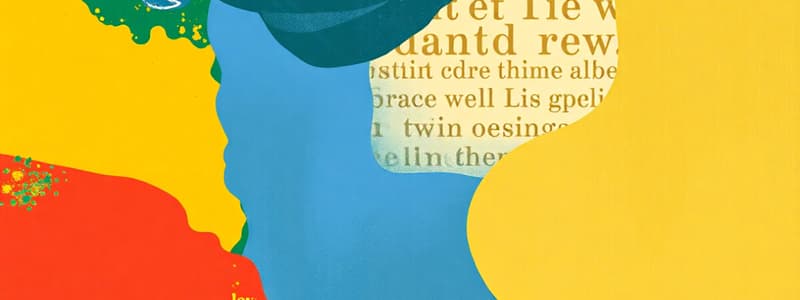Podcast
Questions and Answers
What characterizes the use of formal language in academic texts?
What characterizes the use of formal language in academic texts?
Which of the following is typically avoided in academic writing?
Which of the following is typically avoided in academic writing?
What distinguishes informal language from formal language?
What distinguishes informal language from formal language?
Why is academic text considered essential in professional settings?
Why is academic text considered essential in professional settings?
Signup and view all the answers
Which of the following best reflects the complexity of academic language?
Which of the following best reflects the complexity of academic language?
Signup and view all the answers
What is the primary focus of an academic text's structure?
What is the primary focus of an academic text's structure?
Signup and view all the answers
What does the tone of an academic text typically convey?
What does the tone of an academic text typically convey?
Signup and view all the answers
Which of the following best describes ‘hedging’ in academic writing?
Which of the following best describes ‘hedging’ in academic writing?
Signup and view all the answers
Why is precision important in academic writing?
Why is precision important in academic writing?
Signup and view all the answers
What characteristic is important for the language used in an academic text?
What characteristic is important for the language used in an academic text?
Signup and view all the answers
Which of the following components is NOT a part of the typical structure of an academic text?
Which of the following components is NOT a part of the typical structure of an academic text?
Signup and view all the answers
What is the role of citation in academic writing?
What is the role of citation in academic writing?
Signup and view all the answers
What does an evidence-based argument in academic writing rely on?
What does an evidence-based argument in academic writing rely on?
Signup and view all the answers
What is the primary purpose of summarizing a text?
What is the primary purpose of summarizing a text?
Signup and view all the answers
Which of the following techniques is NOT mentioned as a summarizing technique?
Which of the following techniques is NOT mentioned as a summarizing technique?
Signup and view all the answers
In chronological order, what does the term 'chrono' refer to?
In chronological order, what does the term 'chrono' refer to?
Signup and view all the answers
Where is a thesis statement typically located in an essay?
Where is a thesis statement typically located in an essay?
Signup and view all the answers
What do subpoints in an essay help the reader understand?
What do subpoints in an essay help the reader understand?
Signup and view all the answers
Which writing mode helps explain the reasons behind actions or events?
Which writing mode helps explain the reasons behind actions or events?
Signup and view all the answers
What is a key feature of a thesis statement?
What is a key feature of a thesis statement?
Signup and view all the answers
Which writing pattern discusses both similarities and differences?
Which writing pattern discusses both similarities and differences?
Signup and view all the answers
What is the primary focus of formalism in literary criticism?
What is the primary focus of formalism in literary criticism?
Signup and view all the answers
Which of the following aspects does formalism disregard?
Which of the following aspects does formalism disregard?
Signup and view all the answers
What does the evaluation stage of literary criticism involve?
What does the evaluation stage of literary criticism involve?
Signup and view all the answers
How did formalism impact modern literature?
How did formalism impact modern literature?
Signup and view all the answers
Which question aligns most closely with formalist criticism?
Which question aligns most closely with formalist criticism?
Signup and view all the answers
What is an example of a formalist technique?
What is an example of a formalist technique?
Signup and view all the answers
What does literary theory seek to determine?
What does literary theory seek to determine?
Signup and view all the answers
In formalism, what type of literature serves as a good example?
In formalism, what type of literature serves as a good example?
Signup and view all the answers
What does formalist literary criticism primarily focus on?
What does formalist literary criticism primarily focus on?
Signup and view all the answers
Which of the following best describes the focus of Marxist criticism?
Which of the following best describes the focus of Marxist criticism?
Signup and view all the answers
How does feminist criticism approach literature?
How does feminist criticism approach literature?
Signup and view all the answers
What is a common aspect of reader-response criticism?
What is a common aspect of reader-response criticism?
Signup and view all the answers
Why is it important to consider the context of a literary work during analysis?
Why is it important to consider the context of a literary work during analysis?
Signup and view all the answers
What is the role of a thesis statement in literary analysis?
What is the role of a thesis statement in literary analysis?
Signup and view all the answers
What aspect does reader-response criticism claim cannot be separated from understanding a text?
What aspect does reader-response criticism claim cannot be separated from understanding a text?
Signup and view all the answers
Which of the following is NOT a concern of feminist criticism?
Which of the following is NOT a concern of feminist criticism?
Signup and view all the answers
Study Notes
Features of Academic Text
- Academic text uses formal language, which means using complex language that is objective, precise, and accurate
- Avoid using informal language such as colloquial words and expressions in academic writing.
- Academic writing should be objective and impersonal, relying on evidence and data to support claims.
- Academic text requires explicitness, meaning clear and concise communication of ideas, avoiding ambiguous language.
Structure of Academic Text
- An academic text typically consists of three parts: an introduction, a body, and a conclusion.
- The introduction introduces the topic, provides background information, and states the thesis statement.
- The body of the text supports the thesis statement with evidence and arguments.
- The conclusion summarizes the main points of the text and restates the thesis statement.
Language in Academic Text
- Academic text uses formal language, written in the third person, and avoids personal pronouns.
- Academic text is complex and uses more lexical words than grammatical words.
- Citation is crucial in academic writing, acknowledging sources of information to avoid plagiarism.
Gleaning Information from Text Structure
- Text structure is vital for understanding and organizing information effectively.
- Six techniques for summarizing text include identifying the main character, important details, and main ideas using the questions: WHO, WHAT, WHEN, WHERE, WHY, and HOW.
Thesis Statement
- A thesis statement is a complete sentence that encapsulates the main idea of an essay.
- The thesis statement is often found at the end of the introductory paragraph.
- Sub-points help readers understand the essay's organization and support the thesis statement.
Formalism in Literary Criticism
- Formalism focuses on the formal elements of a literary work, analyzing grammar, word choice, and syntax.
- Formalism disregards cultural and historical influences and aims to understand a text through its formal elements.
- Examples of formalism include analyzing repetition and structure in Toni Morrison's "Beloved" and imagery and metaphors in Emily Dickinson's poetry.
Marxist Criticism
- Marxist Criticism examines the differences between economic classes and the implications of capitalism.
- It explores the continuing conflict between the working class and the elite.
- Marxist criticism emphasizes the social and economic context of a literary work.
Feminist Criticism
- Feminist criticism focuses on how literature presents women as subjects of oppression.
- It explores how culture determines gender and how gender equality is portrayed in literature.
- Feminist criticism analyzes gender issues in literary texts and other aspects of human production and daily life.
Reader-Response Criticism
- Reader-Response Criticism centers on the reader's response to a literary work.
- It argues that the reader's role in creating meaning is essential.
- The interaction between the reader and the text is key to understanding the meaning.
- Reader-response criticism explores the impact of the reader's delivery of sounds and visual elements on meaning.
Studying That Suits You
Use AI to generate personalized quizzes and flashcards to suit your learning preferences.
Related Documents
Description
This quiz explores the essential features and structure of academic texts. It covers the use of formal language, objective writing, and the typical organization of academic work. Test your knowledge on how to effectively communicate ideas in an academic context.




